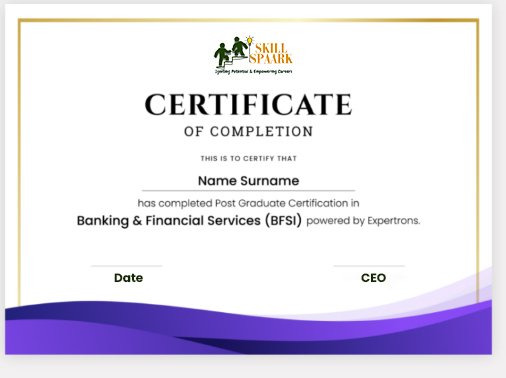
Registration Form
Make a dream entry in India's Top Financial Companies





Course Overview
The Post Graduate Certification in BFSI is designed to equip learners with the essential knowledge and skills required for a successful career in the banking, financial services, and insurance sectors. This program also includes preparation for the IIBF AML & KYC Certificate Examination, a key certification for professionals handling financial transactions and compliance in banking.
This program focuses on core banking operations, risk management, investment strategies, regulatory compliance, AML (Anti-Money Laundering), and KYC (Know Your Customer) policies, ensuring learners gain a strong foundation in BFSI industry standards.
Eligibility
Program Duration: 3 Months
Final year students, Graduates under 26 yrs of age
CTC: MIn 2.5 to 3.5 LPA
Here's your Enrollment Process
After Passing the assessment test, Complete your Enrollment
Begin Your, Training
Appear for the , IIBF AML & KYC Certificate Examination
Upon receiving the IIBF Certificate, move to the placement stage
COURSE OBJECTIVE
WHO SHOULD TAKE THIS COURSE
WHAT SHOULD YOU LEARN FROM THIS COURSE
- Reserve Bank of India : Evolution, Function & latest initiatives
- Risk Regulations in Banking Industry: Basel Norms
- Indian Banking Structure
- Non-Banking Financial Companies
- Important Institutions: NABARD, NPCI etc.
- Activity: Banking Structure
- To check attentiveness in a virtual Class
- Various Banking Customers
- Money Laundering
- Obligations under PMLA
- Obligations under International Agreements- FATF, FATCA & CRS
- Activity: Identifying client risk
- Important Deposits Terminologies (AMB/AQB, Home Branch/Non-Home Branch, Simple/ compound interest, ATM/ Debit Card, HNI Programs etc.)
- Demand Deposits (CASA)
- Time Deposits (FD & RD)
- NRE, NRO & FCNR a/cs
- Operational Aspects of Deposit Accounts: Joint Accounts, Nomination Facility, Inoperative Accounts & Unclaimed Deposits
- Insurance of Bank Deposits
- Case let based Role Play (Pitching of deposit a/c)
- Asset verticals in a Bank
- Important Retail Assets Terminologies ( LTV, Credit Burrous, NPA, Amortization Schedule, Fixed Rates, Floating rates etc.)
- Retail Assets Products: Home Loans, LAP, Gold Loans, LAP, Personal Loans and Consumer Loans, Credit Cards
- Case let based Role Play (Pitching of Retail Asset Product)
- Principles of Lending
- Working Capital and term loans
- Methods of Assessment of Loans
- Credit Management
- Credit Monitoring
- Forex Services in Banking
- Payment Systems in India
- Online Banking
- Cash Management Services
- Safe Deposit Lockers
- Merchant Banking
- Government Business
- Primary Markets
- Secondary Markets
- Structure and Participants of Stock Markets
- Trade Cycle
- Settlement Calendar
- Market Indices
- Important Equity Market indicators
- Equity Analysis
- Features of a Debt Instrument
- Risks in Debt Instruments
- Types of Bonds
- Principles of Bond Valuation
- Duration & Modified Duration,
- Debt Markets and Instruments
- Developments in Indian Bond Markets
- MFs- Meaning
- MF Vs Direct Equity Investments
- MF- Advantages
- Types- Open-Ended & Close Ended, Equity & Debt, Direct and Regular Plans.
- How to Invest in MF
- Case let based Role Play ( Open a Call for a MF)
- SEBI Classification of MFs
- Evaluation of an Equity Fund Scheme
- Evaluation of a Debt Fund Scheme
- Factsheets
- Case let based Role Play (Fund Recommendation MF)
- The Concept of Risk, Perils and Hazards- Classification of Risks
- Risk Assessment, Risk Transfer & Mitigation Methods
- The Concept of Insurance
- Principle of Probability and Law of Large Numbers
- Pooling of Resources-Sharing of Risks
- Insurance as Security / Solidarity
- Moral Hazard / Morale Hazard
- Adverse Selection
- Utmost Good Faith
- Insurable Interest – Material Facts
- Proximate Cause
- Indemnity –Valued Policy
- Subrogation
- Legal Characteristics of Insurance Contract
- Types, Life & General Insurance (Motor, Health, Mediclaim, Travel) Products
- Case let based Role Play (Pitching of Insurance Products)
- Introduction to Derivatives
- Forwards & Futures
- Options Terminology
- ITM, ATM and OTM Options
- Pay-off: Call and Put Options
- Hedging and Speculation with derivatives
- Derivative Markets in India
- Alternate Investments: Commodities trading, PMS, REITs, AIFs etc.
- Risk, Return and Asset Allocation
- Planning for financial Goals
- Ethics in BFSI
- Difference between a mistake & a fraud
- Examples of Miss-selling in BFSI
- Money Laundering
- Obligations under PMLA
- Obligations under International Agreements- FATF, FATCA & CRS
- Activity: Identifying client risk
CERTIFICATION
In addition to earning a certificate from IIBF in AML & KYC, enrolling in this esteemed program will also grant you a prestigious PG-Certificate facilitated by Expertrons. This unique combination of expertise ensures you acquire essential skills tailored specifically for the BFSI sector, paving the way for professional excellence.

FAQ
What is BFSI, and why is it important?
BFSI stands for Banking, Financial Services, and Insurance. It is a key sector in the economy, dealing with banking operations, financial planning, investment management, and risk assessment. This course provides in-depth knowledge of the BFSI industry and regulatory compliance.
Do I need prior banking experience to enroll in this course?
No! The course is designed for both beginners and experienced professionals. It covers fundamental concepts and advanced topics in banking, finance, and compliance.
What is the IIBF AML & KYC Certification?
The Indian Institute of Banking and Finance (IIBF) conducts the AML & KYC Certificate Examination, which is highly recognized in the banking industry. It validates expertise in anti-money laundering, fraud detection, and financial compliance.
How will this course help in my career?
This course prepares you for high-demand roles in banking, financial services, and insurance, including compliance, investment banking, risk management, and financial planning. It also enhances job prospects by preparing you for the IIBF AML & KYC Certification.
What real-world skills will I gain from this course?
- Understanding of core banking operations & financial services.
- Knowledge of risk management & fraud detection techniques.
- Practical expertise in AML & KYC compliance strategies.
- Hands-on experience with financial regulations & reporting frameworks.
Do I need to take the IIBF AML & KYC exam separately?
Yes, the IIBF AML & KYC exam is conducted separately by the Indian Institute of Banking and Finance (IIBF). This course prepares you thoroughly with study materials, practice tests, and guidance.
